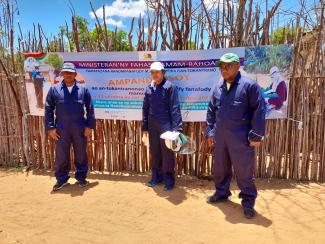For Immediate Release
Press Release
Annual effort will protect 600,000 people from deadly malaria through 2024.
ANTANANARIVO – The American people are helping Madagascar combat malaria – the disease most commonly seen at health centers across the country – through support for a new spray campaign that will treat the walls and ceilings of more than 165,000 homes with insecticide certified as safe for humans.
An October 30-December 1 Indoor Residual Spraying (IRS) campaign supported by the U.S President’s Malaria Initiative (PMI) in five health districts that have experienced high numbers of malaria cases will protect more than 600,000 people, including 14,000 pregnant women and 84,000 children under five years.
Performed in strict compliance with environmental regulations, the spray campaign, managed by the U.S. Agency for International Development (USAID) through the PMI Evolve activity, is monitored monthly to ensure treatments remain effective.
New for the 2023 campaign is the introduction of a new insecticide in pilot districts, the fourth to be used, to expand the rotation of these products to reduce the risk of mosquitoes becoming resistant to the insecticides and better protect the public from malaria.
And for the first time, Madagascar’s National Malaria Program (NMP) is leading planning, execution, supervision, and reporting of the 2023 campaign in one the districts, a key advancement in the NMP's leadership capacity to plan and implement malaria control, ultimately leading to the full transfer of these programs to the Ministry of Public Health.
"Residual spraying is a proven effective tool for reducing incidence and mortality from malaria in Madagascar," Mission Director Michele Russell said as the campaign began. “Transferring ownership of the campaign to the NMP in a pilot high burden district is an important first step in Madagascar taking progressive ownership of these campaigns in the future.”
PMI Evolve conducts scientific monitoring in seven districts of Madagascar, to assess the impact of previous IRS campaigns on mosquito abundance and changes in mosquito biting behaviors and susceptibility to insecticides. The monitoring includes the districts selected for spraying and will inform the National Malaria Program’s (NMP) future malaria control decisions.
In 2023, Madagascar regressed in terms of malaria control, signaling a need for strong prevention measures like IRS campaigns and bed net distribution. Based on data from 2022, the campaign targeted the Health Districts of Iakora, Ivohibe, Isandra, Taolagnaro and Ankazoabo Atsimo.
The U.S. government is the largest bilateral donor of support to Madagascar to strengthen access to and deliver quality health services, allocating more than $440 million since 2015 to fund health activities, including investment of $26 million in 2022 for malaria control and prevention.
# # #

